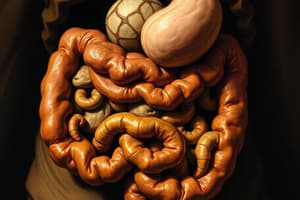Podcast
Questions and Answers
Flashcards
Mechanical Digestion
Mechanical Digestion
The process of physically breaking down food into smaller pieces. It involves chewing, grinding, and mixing food with saliva.
Mastication
Mastication
The first stage of mechanical digestion where food is chewed and ground by the teeth.
Insalivation
Insalivation
Mixing chewed food with saliva using the tongue, forming a bolus.
Deglutition
Deglutition
Signup and view all the flashcards
Chemical Digestion
Chemical Digestion
Signup and view all the flashcards
Gastric Juices
Gastric Juices
Signup and view all the flashcards
Chyme
Chyme
Signup and view all the flashcards
Absorption in Small Intestine
Absorption in Small Intestine
Signup and view all the flashcards
Intestinal Folds
Intestinal Folds
Signup and view all the flashcards
Intestinal Villi
Intestinal Villi
Signup and view all the flashcards
Study Notes
Mechanical Digestion
- Mechanical digestion reduces food particle size for easier transport.
- Mastication (chewing) involves tearing, cutting, chewing and grinding food by teeth and jaw movement.
- Insalivation mixes ground food with saliva, forming a bolus.
- Deglutition uses peristalsis to move the bolus through the pharynx and esophagus to the stomach.
Chemical Digestion
- Chemical digestion transforms food into nutrients through enzymes in digestive juices.
- In the mouth, saliva breaks down carbohydrates.
- In the stomach, gastric juices (pepsin) break down proteins, forming chyme.
- In the small intestine, intestinal juices, bile, and pancreatic juices complete chemical transformation, forming chyle (nutrients, water, and undigested products).
Absorption in the Small Intestine
- Nutrient absorption in the small intestine is fast due to its large surface area.
- The small intestine is long (7-8 meters) and has folds (intestinal folds).
- Intestinal villi greatly increase surface area.
- Villi contain capillaries and blood vessels for nutrient absorption.
- Microvilli on the villi's surface further increase surface area.
Absorption in the Large Intestine
- The large intestine absorbs most remaining water and minerals.
- It is wider than the small intestine (approximately 1 meter long).
- Gut flora transforms undigested products into feces.
- Feces is expelled through the anus (egestion/defecation).
- Fiber cannot be digested or absorbed by the body.
Studying That Suits You
Use AI to generate personalized quizzes and flashcards to suit your learning preferences.
Description
This quiz covers the essential processes of mechanical and chemical digestion, as well as nutrient absorption in the small intestine. Test your knowledge on how food is reduced in size, transformed into nutrients, and absorbed in the digestive system. Perfect for students studying biology.




